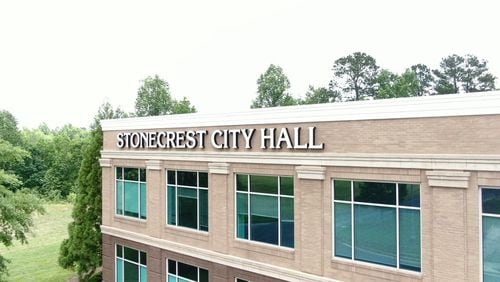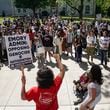As Stonecrest continues to reckon with a recent scandal involving how city leaders and former staff members used federal pandemic relief funds, millions more is on its way to the city.
Stonecrest is poised to receive roughly $9.7 million as part of the American Rescue Plan Act (ARPA) — President Joe Biden’s $1.9-trillion stimulus package. That’s significantly more than the $6.2 million the city received at the end of 2020. An internal investigation found strong evidence that some of those funds were used in a kickback scheme by city staff members, who were fired and replaced.
The scandal has loomed over the city this year, forcing Stonecrest’s leaders to grapple with how to oversee this round of relief money. Councilmembers are talking about moving forward and emphasizing transparency, while the city’s embattled mayor, who is mentioned in the investigative report, continues to defend the prior program.
Acting City Manager Janice Allen Jackson, who Stonecrest hired after the first program’s implementation and subsequent implosion, said she knows this upcoming effort will be under extra scrutiny from residents and watchdogs, which is why they plan to hire outside help.
“We are not trying to go this alone,” she said. “To a large extent, we’re not going to use our staff to do this. That’s why we’re looking for an outside entity with a proven track record to do it for us.”
Two organizations applied to run Stonecrest’s ARPA program before the city stopped accepting proposals this week. Jackson wouldn’t name them, but she said city staff and the City Council hope to choose a partner within roughly 90 days.
ARPA funds don’t have to be allocated until the end of 2024, but Mayor Pro Tem George Turner said at a recent meeting that the city can’t take that long to finalize its plans. He said there’s still many residents who need short-term assistance to weather the pandemic.
“I know that we’re proceeding with great caution to make sure that we don’t have any stumbles, but at the same time we have some people out there who really, really need some assistance,” he said Sept. 13 during a work session. “So as safely and quickly as we can, we want to try to get to them and provide some assistance.”
A program to assist small businesses will likely be a part of the city’s plan, alongside long-term projects such as broadband or stormwater improvements. Residents will be able to participate and give their thoughts during public discussions.
At the end of last year, Stonecrest received $6.2 million in Coronavirus Aid, Relief and Economic Security (CARES) Act funds, which was intended to provide immediate relief to struggling residents and local governments.
Mayor Jason Lary and a few former staff members partnered with a newly formed nonprofit, Municipal Resource Partners, to disburse CARES Act funds to small businesses. Other city employees led the city’s nonprofit grant effort under the name Stonecrest Cares.
Lary praised the programs before and after they came under scrutiny following a bombshell internal investigation, which alleged those city employees misused the funds and potentially funneled some back to people close to them. Neither Lary nor anyone else mentioned in the investigative report has been charged with any crimes.
Lary has denied the kickback allegations and at the Sept. 13 meeting, he spoke on the incident for the first time in months, continuing to defend the program and staff members who were fired and replaced in the wake of the investigation.
“Good people lost their jobs and their livelihoods over this (CARES Act program). And we piled on top of them — no, other people piled on top of them,” Lary said during the Sept. 13 meeting. “... What happened last time is that everybody hit the eject button and put it in our laps and we had to do the best that we could do.”
Lary also emphasized the time crunch presented by the CARES Act. He said, “Prior staff had 46 days — not three years — 46 days to put a program together, distribute $6.2 million, a thousand people calling you everyday, a thousand people worrying the dog-hell out of you about what was going to happen to their livelihoods and their business.”
He declined an AJC request to comment further about the CARES Act program and the allegations in the report.
When asked for updates on the city’s investigation, Jackson said she had no updates. It’s unknown whether federal or state authorities have decided to look into how the city used CARES Act funds.
The city will receive its ARPA allotment in two halves. The first half, roughly $4.9 million, has already been transferred to the city, while it should receive the second amount next May. Jackson said the city is trying to learn from the CARES Act debacle and will thoroughly vet the two organizations vying to run the city’s ARPA program.
“We want to bring in somebody that we can depend on to make sure that we understand all the rules, regulations and guidelines, which was also probably something that was not a part of the first approach,” she said. “We want somebody that will be responsible for it.”
About the Author







